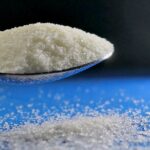Potassium is an essential mineral and electrolyte that is necessary for many vital processes in the human body. It is the third most abundant mineral in the body, after calcium and phosphorus, and is involved in a wide range of physiological functions.
Some of the key functions of potassium in the body includes
- Regulating fluid balance – Potassium helps to regulate the balance of fluids in the body, working in concert with sodium and other electrolytes.
- Supporting nerve and muscle function – Potassium plays a critical role in the transmission of nerve impulses and the contraction of muscles, including the heart muscle.
- Maintaining normal blood pressure – Potassium helps to regulate blood pressure by counteracting the effects of sodium in the body.
- Supporting bone health – Potassium may help support bone health by reducing the amount of calcium excreted in the urine.
Some dietary sources of potassium include bananas, sweet potatoes, spinach, tomatoes, beans, nuts, and dairy products. The recommended daily intake of potassium for adults is 2,500 to 3,000 milligrams per day, although this may vary depending on factors such as age, sex, and health status.
While potassium is important for health, excessive intake can be harmful, particularly in individuals with certain medical conditions or who are taking certain medications. It is important to talk to a healthcare provider before taking potassium supplements or making significant changes to your diet.
Potassium is a chemical element with the symbol K and atomic number 19. It is an alkali metal and belongs to group 1 of the periodic table. There is only one naturally occurring isotope of potassium, which is potassium-39. However, there are different types of potassium compounds that are commonly used in various industries and applications.
Here are some of the most common types of potassium
- Potassium Chloride (KCl) – This is the most common type of potassium compound used in fertilizers, as a salt substitute, and in various other industrial applications.
- Potassium Nitrate (KNO3) – This compound is used as a fertilizer, in the production of gunpowder, and in some food preservatives.
- Potassium Hydroxide (KOH) – Also known as caustic potash, this compound is used in the manufacture of soap, detergents, and other chemicals.
- Potassium Carbonate (K2CO3) – This is a white, crystalline substance that is used in the production of glass, as a drying agent in the chemical industry, and in some medicines.
- Potassium Permanganate (KMnO4) – This is a powerful oxidizing agent that is used in water treatment, as a disinfectant, and in some industrial processes.
- Potassium Cyanide (KCN) – This is a highly toxic compound that is used in the electroplating industry, as a reagent in organic synthesis, and in some gold mining operations.
Potassium Rich Foods
- Fruits – bananas, cantaloupe, oranges, kiwi, apricots, avocados, and strawberries.
- Vegetables – spinach, sweet potato, potato, tomato, broccoli, Brussels sprouts, peas, and carrots.
- Dairy products – milk and yogurt.
- Legumes – lentils, kidney beans, chickpeas, and soybeans.
- Nuts and seeds – almonds, pistachios, peanuts, and sunflower seeds.
- Fish – salmon and tuna.
- Meats – beef and pork.
- Whole grains – brown rice, quinoa, and whole wheat bread.
It’s worth noting that some of the above foods also contain high levels of sodium, which can have a negative impact on blood pressure and overall health. Therefore, it is important to maintain a balanced diet and limit processed and high-sodium foods.


